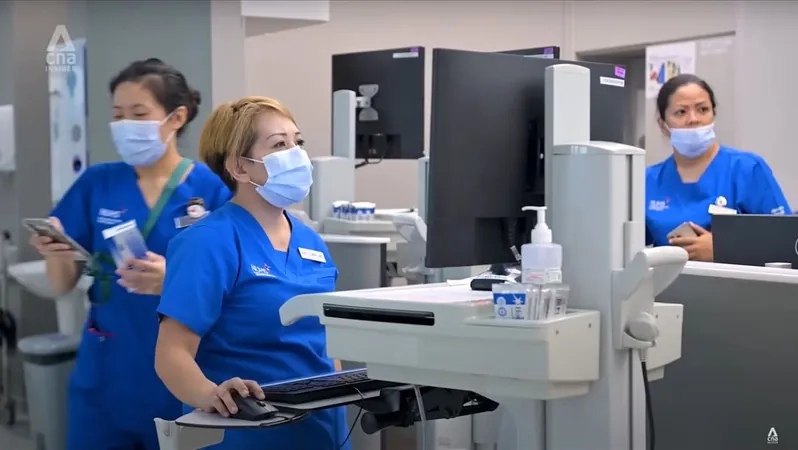
Is Singapore Facing an Unstoppable Surge in Healthcare Costs? Here's What You Need to Know!
2024-11-22
Author: Sarah
As healthcare expenses in Singapore climb steadily, citizens are forced to confront the reality: what can be done to mitigate these rising costs?
Singapore's healthcare system has come under scrutiny as the costs continue to rise, impacting citizens' access to medical care. Recent experiences from locals shed light on a pressing issue that has been exacerbated by the COVID-19 pandemic and technological advancements in treatment.
Take the story of 51-year-old Hariati Abdul Muhin, who experienced severe knee pain that disrupted her favorite pastimes, including shopping and traveling to Malaysia. After struggling with her condition, Hariati sought medical advice from a polyclinic, which led her to the National University Hospital (NUH) for a knee scan. The diagnosis revealed thinning cartilage and a recommendation for knee replacement surgery—a solution that many in her age group at NUH have also explored.
Knee replacement surgery has become increasingly common in Singapore, with over 1,000 procedures performed annually. Experts attribute this rise to several factors, including enhanced awareness of treatment options and significant technological advancements that improve the durability and effectiveness of implants. Notably, better pain management has drastically reduced the duration of hospital stays, allowing patients like Hariati to be discharged within a day while keeping expenses manageable, thanks to MediShield Life and government subsidies.
However, as startling as it sounds, the cost of knee implants has risen from S$3,000-S$3,500 a decade ago to a staggering S$4,500-S$5,000 today. The healthcare landscape has shifted dramatically, prompting Health Minister Ong Ye Kung to highlight these rising costs as a major concern during the recent budget discussions.
Operational Challenges and Staffing Shortages
One primary driver behind these escalating expenses is the high cost of manpower, accounting for 60% of healthcare expenditure. The shortage of skilled healthcare workers has further led to increased wages, putting additional pressure on hospitals. Furthermore, rising costs of pharmaceuticals, medical supplies, and logistics contribute to the fiscal burden faced by the healthcare system.
In a bid to counter these challenges, hospitals are implementing cost-management strategies. For instance, switching to generic drugs where appropriate has yielded savings of approximately 20% on commonly prescribed medications for chronic conditions. Moreover, innovative solutions like smart wards equipped with digital technology are being tested to enhance nursing efficiency by allowing a single nurse to manage more patients—up to six in a smart ward versus five in a traditional setting.
An Aging Population Poses Greater Strain
Singapore’s aging demographic, with projections indicating that one in four citizens will be over 65 by 2030, is another significant factor burdening the healthcare system. The increasing prevalence of chronic diseases among seniors mirrors trends seen in other developed nations, where healthcare spending skyrockets in tandem with age.
A multifaceted approach to healthcare financing is crucial. Singapore has created a resilient healthcare financing system involving government subsidies, the national MediShield Life insurance, and MediSave accounts, which all work together to defray medical costs.
Government Initiatives to Alleviate Costs
Anticipating the trend in rising healthcare costs, the government announced upcoming adjustments to MediShield Life premiums—expected to rise by 22% on average over three years to enhance coverage limits. Additionally, the introduction of new treatments, particularly in the area of cell and gene therapies, highlights the government's commitment to improving care options and managing expenses effectively.
As part of this forward-thinking strategy, more outpatient treatments and home healthcare solutions will be included in insurance coverage, which will ultimately reduce hospital stays—typically a significant contributor to healthcare expenses.
Community-Based Healthcare: Finding Solutions
Experts believe that the solution lies partly in empowering local family physicians to handle more basic healthcare needs, reducing the reliance on hospital care. Programs such as Healthier SG aim to strengthen community-based care, enhancing preventative measures and ongoing medical management without overwhelming hospital resources.
In conclusion, while Singapore faces an uphill battle against rising healthcare costs, initiatives at multiple levels—from government policies to community healthcare improvements—could help mitigate the burden on patients. As citizens, staying informed about available resources and engaging with the healthcare system can also play a crucial role in navigating this evolving landscape.
Stay tuned for updates on how Singapore addresses healthcare challenges and discover strategies to manage your health expenses more effectively!


 Brasil (PT)
Brasil (PT)
 Canada (EN)
Canada (EN)
 Chile (ES)
Chile (ES)
 España (ES)
España (ES)
 France (FR)
France (FR)
 Hong Kong (EN)
Hong Kong (EN)
 Italia (IT)
Italia (IT)
 日本 (JA)
日本 (JA)
 Magyarország (HU)
Magyarország (HU)
 Norge (NO)
Norge (NO)
 Polska (PL)
Polska (PL)
 Schweiz (DE)
Schweiz (DE)
 Singapore (EN)
Singapore (EN)
 Sverige (SV)
Sverige (SV)
 Suomi (FI)
Suomi (FI)
 Türkiye (TR)
Türkiye (TR)